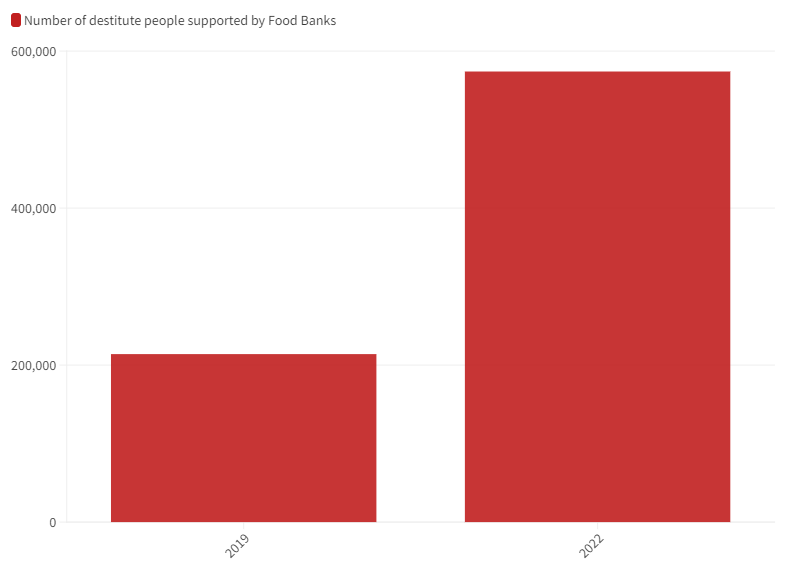A recent study by The Trussell Trust found that 14% of UK adults are experiencing food insecurity in 2023.
This roughly equates to a staggering 11.3 million people, a figure that has worsened significantly since the pandemic.
This data was supported by a study published by the Joseph Rowntree Foundation (JRF).
JRF data found that more than one million children in the UK experienced ‘destitution’ last year, defined as the financial inability to meet their basic physical needs to stay warm, dry, clean and fed.
The study found that half destitute households in the UK. One of the conditions of destitution, the foundation defined, was that they ‘have had fewer than two meals a day for two or more days’.
The study identified that adults frequently reported being unable to afford over one meal per day and found that almost two-thirds of those surveyed said they had gone hungry in the past month, often relying on food banks or family members for food supplies.
The Trussell Trust, the UK’s largest network of food banks, distributed almost three million emergency food parcels between 2022-23, the highest recorded number, which had increased by 37% from the previous year.
JRF data found that the number of destitute people using food banks had more than doubled between 2019 – 2022, from 214,000 in 2019 up to 574,000 in 2022.

The Felix Project
London-based charity, The Felix Project attributes the increase in individuals experiencing food insecurity to the impact of successive national lockdowns on income and job security.
Charlotte Hill, CEO of the Felix Project said: “We are seeing a stark change of people who never used food banks before. But now their mortgage has gone up, rent has gone up, the only thing that is elastic is the food.”
As a result, food is often the first thing to be reduced on a household’s list of expenses.
The Felix Project’s mission is to fight food waste and hunger by generating three million tonnes of goods and edible surplus each year.
Hill added: ‘‘Our vision is simple: good food, where no Londoner goes hungry.”
The Green Scheme
The newest mission the Felix Project has taken on is the Green Scheme, which collects food from all over the capital with the aim of reducing food waste.
Hill explained that the reason for this is at the farm level, there is a huge amount of surplus that gets either ploughed back into the soil or sent to what is known as anaerobic digestion.
This means that a huge amount of edible food is being digested and Hill hopes to change this.
Hill added: “It’s morally wrong that at a time where both Londoners in the capital and farmers in the fields are struggling, great fruit and veg is being ploughed back into the fields.
“That food could be going to people. If even a fraction of that was used for people who are hungry, it could be incredibly helpful.”
What’s next for the Felix Project?
As the seasons change and winter approaches, anxiety around food remains front of mind for many Londoners.
Hill said: “We’re hopeful we can win the fight against hunger, but we need more support and we need more awareness.”




